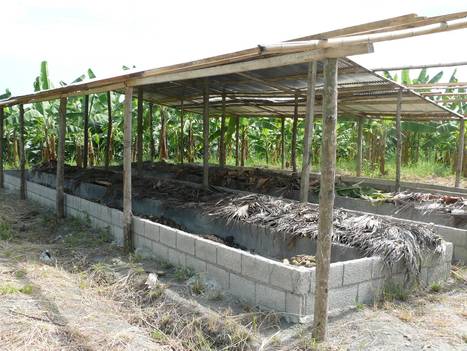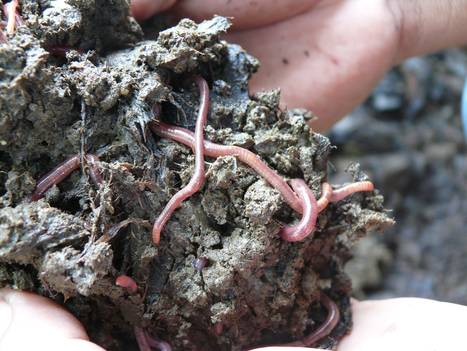Organic agriculture

Organic agriculture is “a holistic system of production which promotes and improves the agro-ecosystem health, including biodiversity, biological cycles and soil biological activity, taking into account that regional conditions require locally adapted systems, which is achieved by using, when possible, cultural, biological and mechanical methods as opposed to synthetic inputs”1.
In 2013, the International Federation for Organic Agriculture Movements (IFOAM) estimated that organic banana production represented 850 000 metric tons, almost 1% of the global banana production area2. In 2015, the countries that produced most organic bananas were the Dominican Republic (12 000 ha), Ecuador (11 500 ha), the Philippines (6 500 ha), Peru (5 500 ha) and Costa Rica (4 500 ha).
Principles of organic agriculture
- Health: organic agriculture should sustain and promote the health of soil, plant, animal, person and planet as single and indivisible.
- Ecology: organic agriculture should be based on living ecological cycles and systems, work with them, emulate them and help sustain them.
- Fairness: organic agriculture should be based on relationships that ensure fairness with regard to the common environment and life opportunities.
- Care: organic agriculture should be managed in a responsible manner and with caution to protect the health and well-being of present and future generations and the environment3.
An organic production system must comply with the following aspects4:
- Settle on farms after a conversion period, the duration of which shall be determined by specific factors of each site, such as the history of the land and the production system used.
- Improve the biological diversity of the system.
- Increase the biological activity of the soil.
- Maintain the fertility of the soil in the long term.
- Recycle animal or vegetable waste to return nutrients to the system, minimizing the use of non-renewable sources.
- Use renewable resources in locally organized agricultural systems.
- Promote the healthy use of water, soil and air, as well as minimize all forms of pollution that may result from agricultural production.
- Handle agricultural products during processing with care not to lose the organic integrity in the process.
- Avoid the use of synthetic chemical inputs
- Monitor production
Environmental benefits of organic agriculture5
- Sustainability of the agricultural production system thanks to environmental impact anticipation and agro-ecosystem improvement on the medium and long term. The ecological gains (for example, improved soil condition) benefit organic production in return by enhancing the safety and productivity of the system.
- Improved soil condition that reduces the use of fertilizers.
- Water management and pollution reduction thanks to organic fertilizers.
- Climate change mitigation by reducing fossil fuel consumption and implementing carbon sequestration mechanisms (minimum tillage, returning crop residues to the soil, use of cover crops and rotations, integration of nitrogen-fixing legumes).
- Encouragement of biodiversity: the maintenance of natural areas, use of rotation crops, absence of chemical inputs are practices that allow the diversification of species in and around the cultivated area.
- Absence of genetically modified organisms, which are not allowed at any stage of organic production, processing or handling of the product.
- Ecological services, including soil forming and conditioning, soil stabilization, waste recycling, carbon sequestration, nutrients cycling, predation, pollination and habitats.
Organic Fertilization
The following organic fertilization practices can be implemented in banana plantations to improve the necessary nutrient content of the soil6:
Intercropping: planting seasonal crops between banana rows to increase the soil fertility. The most common intercrops for banana plantations are leguminous crops, but coffee, vanilla, cocoa, and tropical fruits are also used. Intercropping is almost exclusively implemented in the non-export banana sector7. Trees are also an intercrop that provide shade to the plantation and protect banana trees from the wind.
Weed management: mulching, cover cropping or mechanical weed management.
Water conservation: it is important to preserve moisture in the plantation by building terraces to keep water in the field, mulching and planting cover crops, as long as they are not competing with banana plants.
Soil conservation: applying compost in the planting holes of banana trees and adding organic manures afterwards improves the plant’s growth and productivity.

Compost
Compost is one of the main products used in the organic production of bananas. It is a fertilizer based on organic waste that results from a process of decomposition due to soil organisms (bacteria, fungi, worms, mites, insects etc)8 9 feeding on organic waste in air. The nutritional contribution depends on the organic material used for its production.
Among the main benefits of the application of compost are improvements in the soil condition, increased microbiological activity, regulation of temporary excess of minerals or toxic substances, increased soil fertility, prevention of nutrient loss by leaching, reduced intake of nitrates and less pollution of aquifers10 11.
It is important to consider that banana roots require a good soil structure, including porosity, depth, adequate ventilation and good natural nutrients. Any physical or chemical constraint that limits its growth reduces the productive potential of the plant. With compost applications, it is possible to not just substitute inorganic fertilizers, but also to improve the soil structure to provide the best conditions for banana production in the long term12. Before any application, it is necessary to conduct an analysis of the soil to avoid over or under-fertilization.
References
References
1 FAO. 1999. Committee on Agriculture. Fifteenth Session
2 ITC. 2016. The State of Sustainable Markets p.66
3 IFOAM. Principles of Organic Agriculture
4 FAO. 2005. The importance of soil organic matter Key to drought-resistant soil and sustained food production
5 FAO. What are the environmental benefits of organic agriculture?
6 FIBL. 2011. African Organic Agriculture Training Manual 9-19 Banana
7 BananaLink. Organic
8 Ecosur. Compost
9 FAO. Nutrient Management in Organic Agriculture
10 INIBAP. 1998. Producción de banano orgánico
11 IFOAM. Training manual for organic agriculture in the tropics
12 Unión Europea; Ministerio de Comercio Exterior y Turismo de Perú. Banano orgánico - Manejo Agronómico del Cultivo-Fertilización

